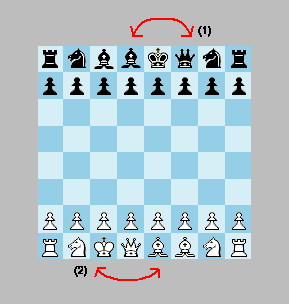Chess-9
This page contains one or more presets for playing a game online with Game Courier, an online server for playing Chess variants by correspondence.
In Chess-9 (Nonary Chess) the players can, before play begins, optionally swap places of the king/queen and a bishop, provided that the bishops end up on different colours. Thus, if the king is swapped (relocated), the bishop (the relocatee) ends up on the king's square. If the queen is swapped, the relocatee ends up on the queen's square. Note that black begins by making the initial swap. Alternatively he can choose to leave the position as it is. The white player then has the option to relocate his king or queen, whereupon he starts the game by making the first move. The method generates 9 attractive positions, modest deviations from the standard setup. Rooks and knights tend to be finely placed on their standard squares. Note that the king retains his castling rights even if it has been relocated. Fischer Random castling is employed. King and rook end up on the same squares as usual.
With these relocation rules the rooks remain in their natural positions, and the bishops are always positioned so that there is still a choice to develop them on either of the queen's or the king's wing. This maintains the strategical ambiguity of the initial position, while sound positions are produced where no definitive advantage can be obtained. Black relocates first. Thusly white gets a chance to make a strategical decision and create an initiative, as in the standard position. Although the initial positions are, as such, a subgroup of Fischer Random, the two parties may choose different setups.
Note! Castling is done by dropping the king on the rook. This is to resolve ambiguites. (The players must themselves keep count of whether the king/rook have already been moved.) Moves are automated (point & click), but rules of check, etc., are ignored. At pawn promotion the player is asked about promotion piece.
Note! During the initial relocation phase, when a red pawn is visible, the player is compelled to pass the move by moving the red pawn. When a green pawn is visible, the player can either make a piece swap or pass the move (by moving the green pawn). You can only swap pieces by typing e.g. "swap e8 c8". When the relocation phase is over the number (1) shows up on the board.
Chess-9 (Nonary Chess).
A Zillions
 program and more information is here.
program and more information is here.See also:
Configuration Chess (a method that generates 400 positions).
Fischer Placement Chess (a method that generates a subset of FRC).
Chess64 (This is the randomized version of Relocation Chess. This also functions as a Chess64 position generator.)
Chess400 (Configuration Random Chess).
Chess20 (Placement Random Chess).
Chess100 (Arrangement Random Chess).
Chess484 (Regroupment Random Chess).
 This 'user submitted' page is a collaboration between the posting user and the Chess Variant Pages. Registered contributors to the Chess Variant Pages have the ability to post their own works, subject to review and editing by the Chess Variant Pages Editorial Staff.
This 'user submitted' page is a collaboration between the posting user and the Chess Variant Pages. Registered contributors to the Chess Variant Pages have the ability to post their own works, subject to review and editing by the Chess Variant Pages Editorial Staff.
By M Winther.
Web page created: 2010-12-21. Web page last updated: 2010-12-21